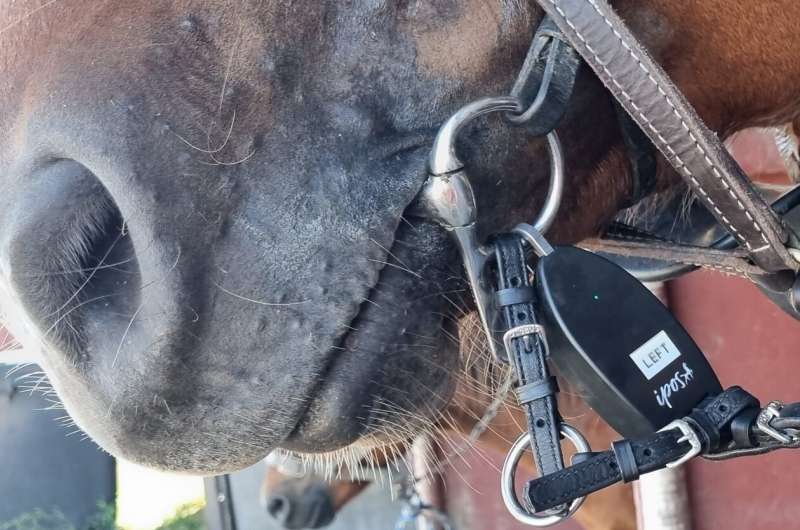
In a pilot study carried out at the University of Helsinki, high rein tension was found to be associated with trotters opening their mouths, which indicates pain or discomfort in the mouth.
Rein tension denotes the force employed by the rider or driver through the reins. It can be measured with a sensor attached between the bit and the rein.
“Our group has previously investigated mouth injuries in trotters, and we found that moderate and severe injuries were associated with certain bit types. It is possible that drivers ended up using those bit types due to problems experienced with lighter rein cues. This is why we wanted to explore rein tension,” says researcher and veterinarian Kati Tuomola from the Faculty of Veterinary Medicine, University of Helsinki.
Eight horses and their drivers were recruited for the study. With the drivers driving their horses on a racetrack at walk and trot, the researchers measured rein tension and recorded video of the horses’ behavior from a moving vehicle. Each horse was equipped with a regular single-jointed bit. Subsequently, one researcher coded the horse’s behavior from the videos in accordance with a predetermined catalog of behaviors. The coder was unaware of any findings associated with rein tension and mouth injuries among these horses.
None of the horses had mouth injuries before the ride. After the ride, three horses had moderate bruises in their mouths. Their median rein tension was numerically higher (approximately 3.5 kg per rein) than that in horses without injuries (approximately 2 kg per rein), and they showed longer periods of rushed walking.
The median rein tension for a single rein varied between 0.5 kg and 3.7 kg, with the highest tension varying between 11 kg and 24 kg. According to the researchers, these rein tensions can be considered rather high, as prior studies have shown that horses avoid tension exceeding 0.6–1 kg.
To investigate behavioral differences during different rein tensions, five 30-second periods were visually selected from the rein tension graphs of all horses, representing samples of tension ranging from low to high. During low rein tension, the horses mainly walked and mostly kept their mouths closed. During periods of higher rein tension, the horses mainly trotted either slowly or quickly, keeping their mouths open for longer periods of time.
“Horse trainers should monitor the horse’s mouth behavior, arousal state and ability to walk calmly, and adjust the training accordingly. The horse keeping its mouth widely or repeatedly open may indicate evasive behavior, meaning discomfort or pain in the mouth. In addition, rushed walking may indicate high arousal, which in turn can increase the risk of mouth injuries,” says Tuomola, the article’s lead author.
More information:
Kati Tuomola et al, Is rein tension associated with horse behaviour and mouth injuries in harness racing trotters? – Pilot study, Applied Animal Behaviour Science (2024). DOI: 10.1016/j.applanim.2024.106356
Citation:
Rein tension may affect horses’ behavior (2024, September 3)
retrieved 3 September 2024
from https://phys.org/news/2024-09-rein-tension-affect-horses-behavior.html
This document is subject to copyright. Apart from any fair dealing for the purpose of private study or research, no
part may be reproduced without the written permission. The content is provided for information purposes only.







